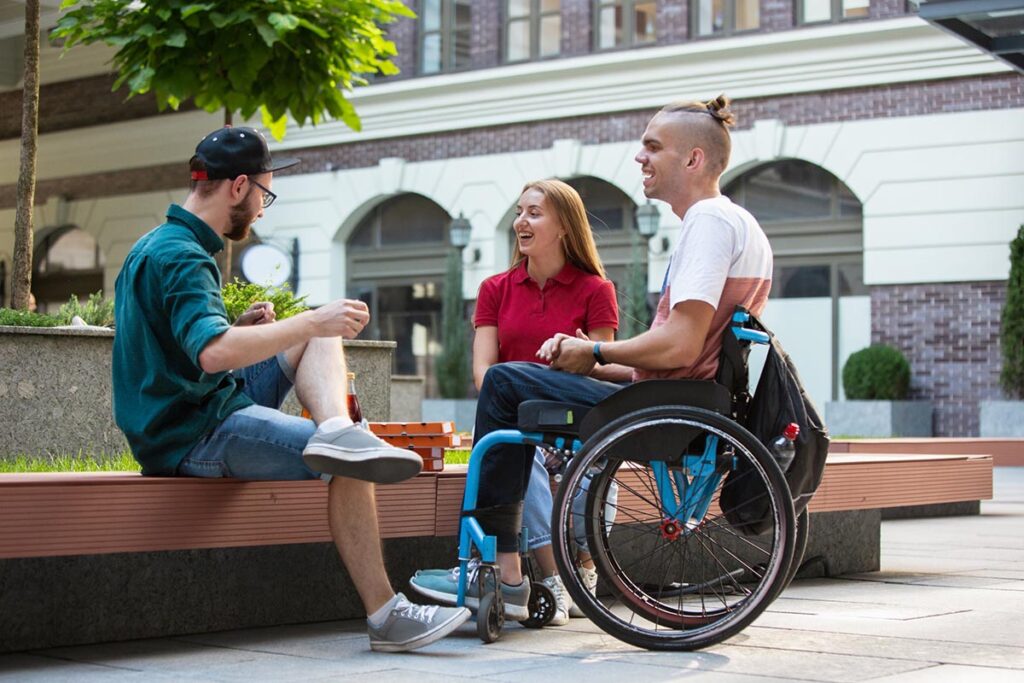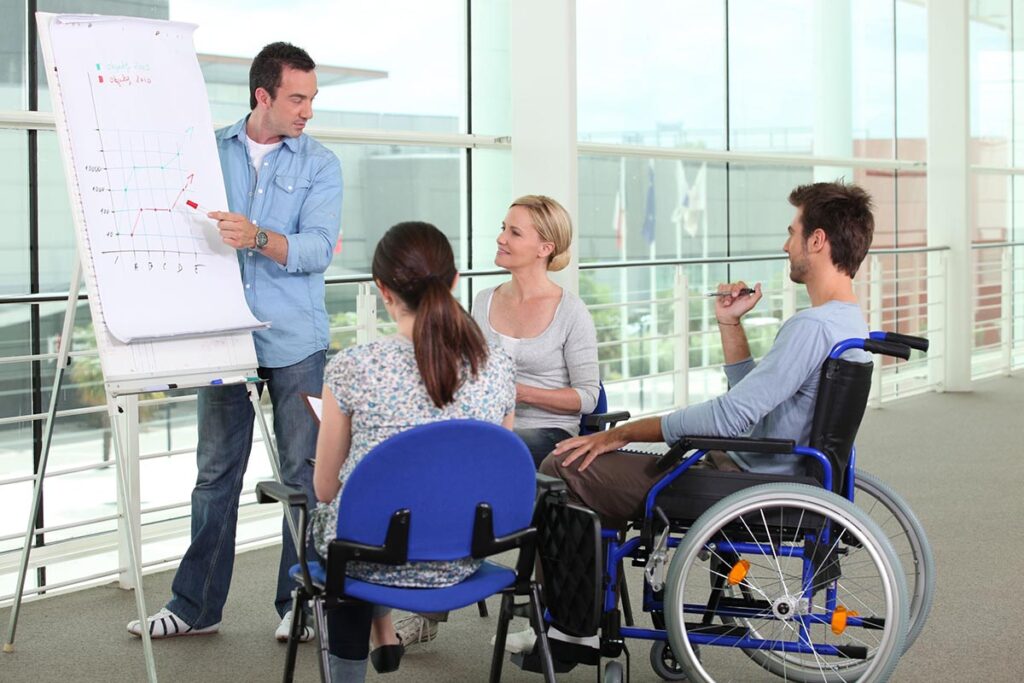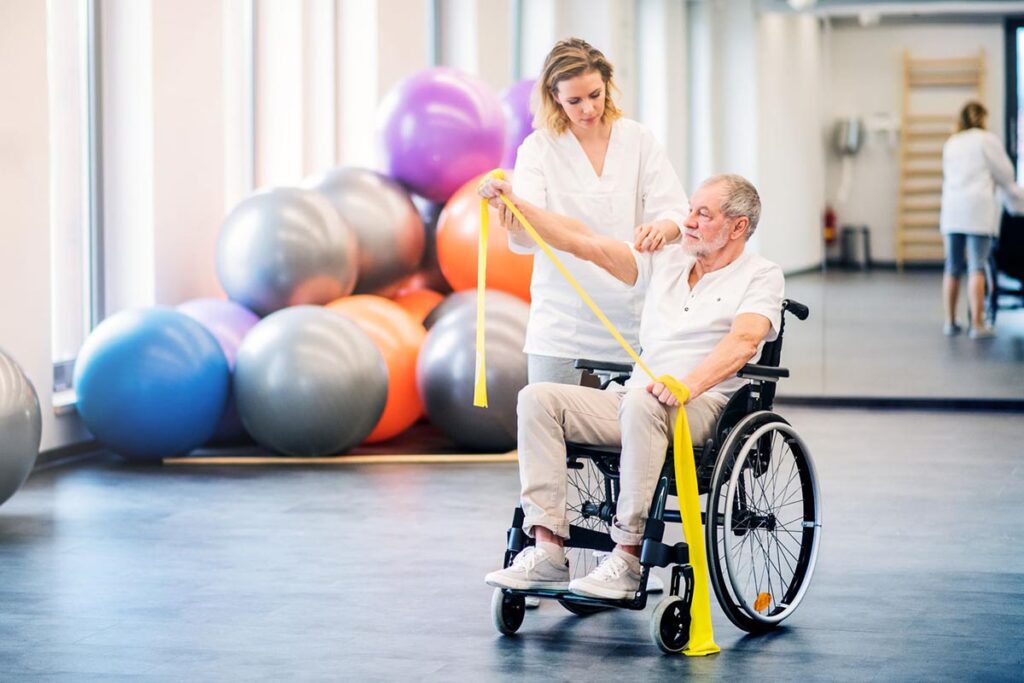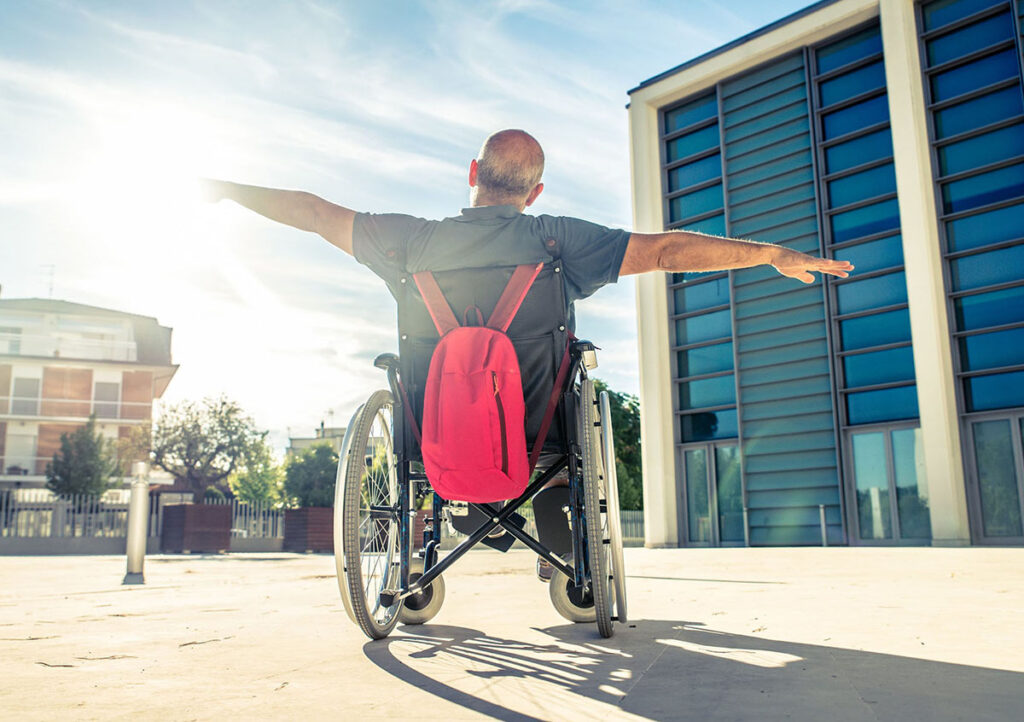Some parents may be unsure how to help their children prepare for adulthood or teach them independent living skills.
However, moving out does not have to be a challenging prospect. You can teach kids independent living skills and let them manage their own lives without constant supervision and guidance.
Young adults with complex care need often do well when they can take charge and become independent.
Life skills to help your child with a disability become independent
Life skills are the actions that most individuals participate in when managing their day-to-day living.
Here are some skills that can help young adults with complex care needs feel more independent and make their decision-making process effortless.
- Using self-care skills (e.g., appropriate hygiene care, grooming, dressing, meal preparation, and doing laundry)
- Eating, showering, toileting
- Taking part in recreational and leisure activities
- Demonstrating personal safety awareness in the home
- Taking drugs as prescribed and getting medical attention when needed
- Providing correct information about their medical condition to health personnel
- Making informed decisions about relationships
- Understanding the responsibilities of home management
- Demonstrating the ability to vote and make informed decisions
- Use of assistive devices and/or technology in the home and community
- Applying for and gaining access to service/support required for success in the (e.g., on-the-job training, employment)
- Using community transportation as independent as possible (e.g., knowledge of community buses and taxi transportation)
By learning these skills, young adults with complex care needs can make informed decisions on how to care for their needs and be as independent as possible. They can learn them with their parents or with the right support of Leaf Complex Care staff members.
Let our experienced support worker help you

At Leaf Complex Care, we offer an extensive list of services. Our support workers have long-standing experience supporting people with complex care needs. They can assist with any obstacles that families face when they need guidance.
Whether it’s providing care and support at home or helping your family transition your child into independence, we are here to help you.
We provide carefully selected support workers and provide them with continuous training. This way, they are up to date on new practices.
Moreover, they entail kindness and compassion in everything that they do. They can assist young adults in learning how to care for themselves and ultimately live enriched and fulfilled life.
The importance of starting early
Living independently, even with help, involves a wide range of skills. Starting with basics early in life can develop the confidence in a person to insist on becoming independent with as little support as possible.
Having everyday life skills such as grooming and cleaning, personal safety, and understanding how to care for oneself is an asset that every person should have. They say competence is confidence; therefore, developing these skills early on is key to feeling confident enough to tackle the obstacle of independent living.
Most of us develop these abilities at home and in school. They serve as the foundation for future learning about what it takes to live independently.
For young adults with complex care needs to learn the exact skills, they will need assistance, careful planning and implementation. A professional support worker can make all the difference in guiding a child with complex care needs through this process. They will take on the responsibility to guide them in the right direction.
Ordinary daily activities can be complex for any young adult with complex care needs. This is why it is critical to work on improving these abilities at a young age. Schools and families can implement various strategies to accomplish this end goal.
Consider where your child needs assistance with daily life tasks and what they currently know and can perform. All of this creates the groundwork for your child to become an adult with independent living skills.
Planning
Having a carefully tailored plan set in place can work wonders. Getting the appropriate assistance or adjustments might take time. However, when you talk to your child about what they want to do once they finish school and involve them in the process, you can deliver a plan that will work for both of you.
Try making plans with them to understand better:
- What they need to accomplish
- What they want
- How they can achieve that
This may also assist them in developing alternative plans, either with you or on their own. If possible, discuss independence and the choices for moving out.
This might include things like:
- Living alone with occasional assistance or with a full-time caregiver
- Living with a companion or pal
Despite the planning, it might be not easy to open this discussion if your intuition tells you to continue caring for your child. However, supporting their independence and giving them a step-by-step guide may be the most effective method to assist them.
Talking to people and socialising
If your child has difficulty communicating, encourage them to interact with others in restaurants or stores. Try asking or pointing to their meal or paying for anything they enjoy. Repeating these tasks might help your youngster learn to complete them independently.
Making new acquaintances and socializing can also assist your youngster in building on their independence. Find organizations, local activities or groups with them and discuss any challenges, such as transportation.
Also, before your child leaves school or home, please encourage them to participate in a few organizations or activities. This can help children in the sense that they feel at ease and get used to socializing independently.
You may also wish to discuss a roommate if you believe they would be lonely after moving out.

Around the home
Even though it may come easy for you to handle tasks around your house, it might be a great challenge for a person with a disability.
Independent living skills for individuals with disabilities around the home can build the confidence in a person to think outside the box and start planning their future for independent living.
Here are some activities that your child must learn how to handle:
- Making a grocery list and purchasing food
- Understanding healthy eating and cooking
- Being in charge of their schedules, such as setting alarms and getting to school or work
- Personal hygiene, including food handling
- Cleaning and doing household tasks such as cleaning and dusting
- Taking care of their health needs, which includes taking drugs and exercising
Learning to accomplish something gives your child confidence to try new things. A reward system or pocket money might encourage them to try new chores.
Meal preparation
One of the most important things for a young person with a disability is to learn how to prepare their own meals. They need to learn beforehand, so they don’t have to depend on relatives or friends to assist them.
Meal preparation can be complex even for persons that don’t have a disability. However, learning to do the simplest things with confidence like cutting your food, boiling or frying an egg or buttering a breed can be an advantage that can save them a lot of time and money.
These skills can also keep them safe from unexpected kitchen accidents.
Relationships
Being lonely can cause harm not only to mental health but to overall health as well.
Relationships come in various shapes and forms– from friends and family to support workers, caregivers, and intimate partners. Hence, the skills necessary to establish successful relationships are diverse and complex.
However, life may be lonely without the ability to nurture and maintain these relations. Therefore, investing in life skills that can develop lasting connections is worthwhile.
You might want to look into three main areas of development:

Making friends
Friendships are more likely to form when your child grows more aware of social interactions and communication with others in the community. However, to do so, they may need to learn the essential ideals of friendship.
Making friends is about respecting people’s feelings, discovering mutual interests, and staying in touch when they are not around. You can break down all of these into small goals or daily routines for your loved one.
They may, for example, develop the practice of contacting a buddy every Sunday at 5 p.m. You’ll be surprised at how fast this can become a habit and how often it enhances their quality of life.
Communication
In a social context, after first impressions, the connection continues to communicate vocally and physically.
Communication concepts can range from:
- Grasping the importance of expressing interest in others
- Asking questions to actively listening to what others have to say
- Replying to a question or acknowledging what someone else says
Perhaps the most challenging communication skill to master is understanding how much body language influences the meaning of a discussion.
Learning the skills connected with successful communication might be a lifelong struggle for any adult. Therefore, be patient and celebrate minor victories with your loved ones if they appear to be making progress.
Social interactions
Friendships are more likely to form when your child grows more aware of social interactions and communication with others in the community. However, to do so, they may need to learn the essential ideals of friendship.
Making friends is about respecting people’s feelings, discovering mutual interests, and staying in touch when they are not around. You can break down all of these into small goals or daily routines for your loved one.
They may, for example, develop the practice of contacting a buddy every Sunday at 5 p.m. You’ll be surprised at how fast this can become a habit and how often it enhances their quality of life.

- Encourage children to look people in the eyes and greet people.
- Model the type of social behaviour you want to encourage, such as listening and reacting to people, using acceptable body language, starting a conversation, sharing information, and dealing with conflict positively.
- Play with them and practice sharing toys and taking turns.
- If sharing is difficult, make copies of favourite toys and keep enough play materials on hand for everyone to enjoy.
- Plan activities you know your child can perform confidently when other children are present.
- Tell them they are doing well when a social situation is going well.
- Observe whether they are tired or overwhelmed, and help them manage their emotions.
Developing skills to live independently
The capacity to be self-sufficient can directly impact self-esteem. It can also impact the perception of how much a person is valued in society as a whole.
Encouraging, fostering, and developing independent living abilities influences a person’s confidence and readiness to take chances on their own!
Risk-taking leads to new learning and personal growth.
Health
A healthy lifestyle is an essential component of overall well-being.
Adults with disabilities can feel better, look better, and improve their long-term health and quality of life by learning skills such as healthy food, exercise, personal cleanliness, and safe sex.
These are some of the most important aspects of healthy living that they need to learn:
Hygiene
Personal appearance and hygiene may enhance confidence in social circumstances. In reality, looking and smelling beautiful may help foster a feeling of confidence and make you feel more accepted and appreciated by others in the community.
Maintaining a good level of personal hygiene is all about daily habits. While many of these may already be in place, simple changes may create a significant impression. It’s the small things that add up to make a happier, healthier, and more confident person.
Showering, brushing teeth, applying deodorant and perfume/aftershave, getting dressed, and combing hair may appear basic. However, proper education on these subjects may considerably enhance personal hygiene and confidence.
Eating and cooking healthy food
Adults with impairments, particularly those with intellectual disability, are prone to eating an unhealthy diet. This is frequently due to a lack of education about the benefits of a good diet.
A healthy diet offers several obvious and not-so-obvious benefits. Nutritious meals give you more energy, help you maintain a healthy weight, and lower your chance of illness or disease later in life. A healthy diet may make a person feel more confident in how they appear and interact with others.
Taking a cooking class is a great way to get started on a healthy diet and eating habits. This will not only assist in learning what items can be combined to make a tasty dinner, but it will also help them develop new cooking abilities, which may even drive them to pursue it as a passion.
Get involved, start eating and preparing healthy meals yourself, and your loved one will hopefully join you.

Exercise
Everyone has a different degree of stamina when exercising, so don’t push your loved one to run a marathon tomorrow.
Daily exercise might begin with as little as a stroll to the store or a few arm lifts. Small habits like these can enhance energy levels and, in the long run, improve body image, strength, and wellbeing.
Our support workers can help you create an exercise program appropriate for your loved one’s abilities.
Aids and adaptations
You need to make certain aids and adaptations before your loved one moves into a new home. Sometimes they need different kinds of devices to be able to cope.
Here are some aids and adaptations that might be useful to have in mind:
- a specialist chopping board that will hold food in place
- a food processor instead of a knife
- an extendable duster
- alarms that use light instead of noise
- a flexible and lightweight vacuum or a robot vacuum
All of this can help the transition to a new home and environment easier.
Learning aids
To be able to learn, children with intellectual disabilities need to have access to some learning aids. They can get a better grasp of the offered knowledge when they have these aids in place:
- pictures or stories
- written instruction
- regularly watching or helping you do tasks
Making a life skills handbook
A ‘life skills handbook’ might assist your youngster with everyday responsibilities when you are not around. It may also encourage young adults to undertake more activities on their own.
The handbook might include the following:
- Step-by-step instructions for daily routines and weekly or monthly duties such as doing the laundry, cleaning the house, or paying payments
- A ‘how to’ section to help caregivers understand their child’s specific needs.
Parents can work with their children to create the guidebook and decide the ideal format for them.
- Picture stories, whiteboards, planners, and whiteboards
- Folders or binders that allow you to add and delete items that change
- Videos
- Flashcards
- Apps for smartphones and tablets
- Graphical or vertical timetable
- Images of activities, phrases, or symbols
- ‘Done’ – used to indicate when an action is finished

Our strategy for providing support
At Leaf Complex Care we address providing support with a strategy in mind. We deliver complex care with a final goal to make individuals with a disability as independent as possible.
Our support workers will manage and teach these activities daily:
- Personal Care- Ensuring that the individuals we support/maintain a good level of personal hygiene
- Medication management – Ordering and administering medication
- Booking and supporting Individuals to attend health appointments
- Support to promote independence by teaching life skills such as meal preparation, cleaning their own environment, laundry etc
- Ensuring the individuals we support have structured and daily routines in place
- Ensuring that the individuals we support are included in their local communities by supporting them to access the community and having access to local amenities
- Sourcing out activities for individuals within their local areas
- Managing challenging behaviours- by using Proactive techniques
- Putting PBS and support plans in place if required
- Support individuals to achieve a positive outcome by supporting individuals to go back to a colleague and work experiences depending on their capability
- Verbal assurance, to help individuals to boost self-esteem and confidence
- Supporting individuals with shopping
- Supporting individuals with managing their finances
- Supporting individuals with their correspondences if required
We make sure that in time our clients will have the chance to live as independently as possible.

